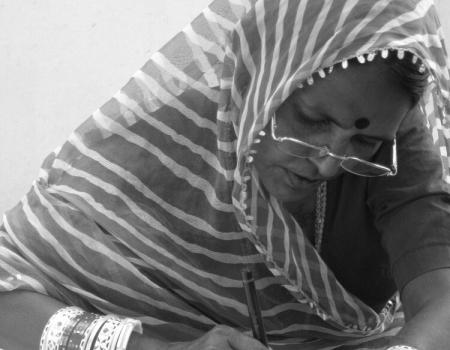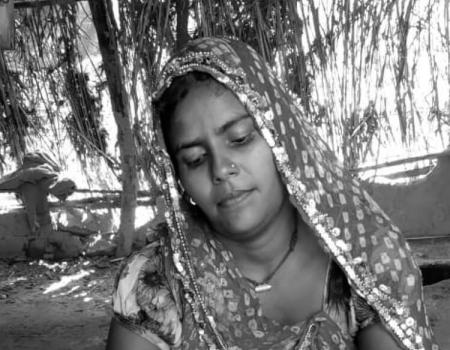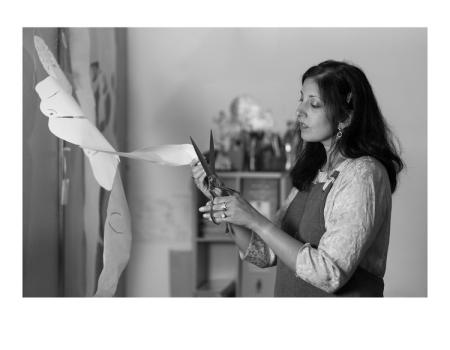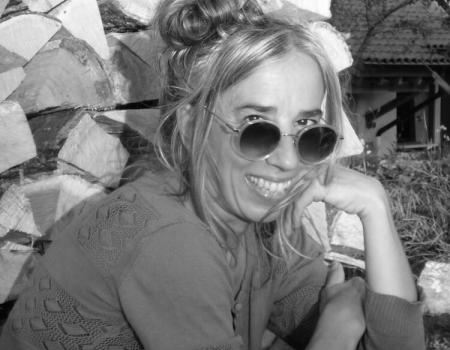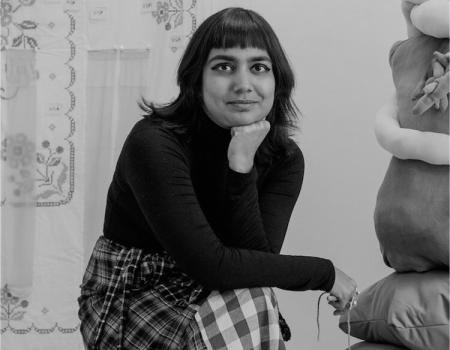Illustration World
India
Para visualizar el contenido de este vídeo, hay que estar logeado o comprar la entrada.
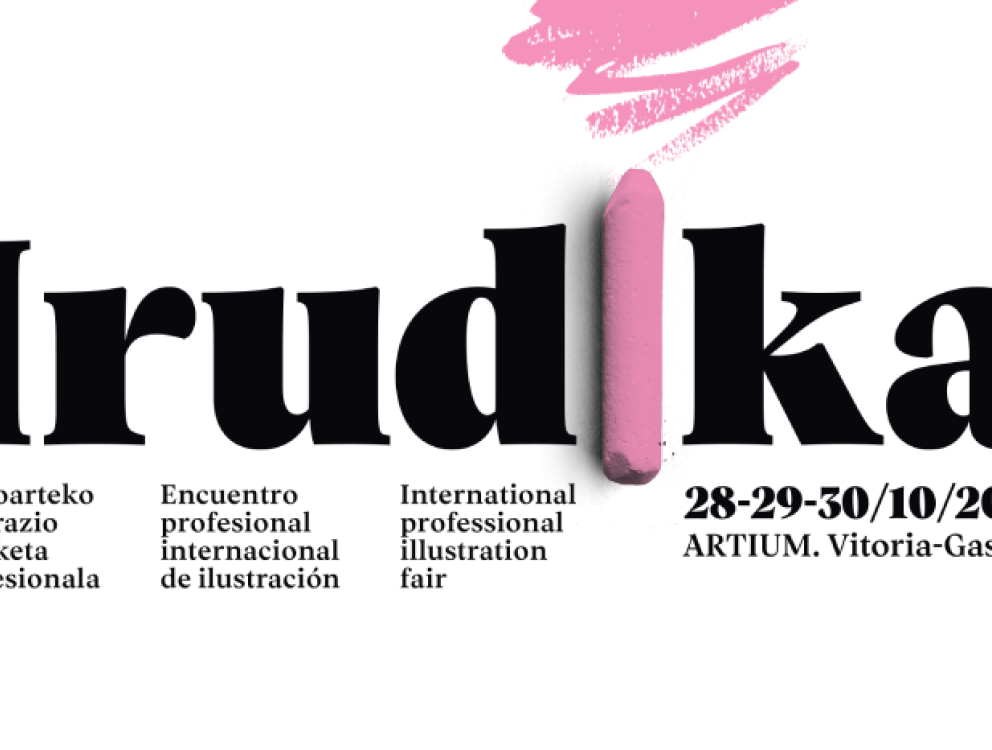
Speakers
Tejubehan
Born in the village Van in Rajasthan, Tejubehan is from the Paua tradition of bards and mystic singers. When she was 10, a terrible drought and famine forced the family to move away from the village in search of food and a living. They wandered around until they reached Ahmedabad, where the family lived in a makeshift slum. Tejubehan met the artist and singer Ganesh Jogi there, and the two became childhood friends, finally marrying when she was 16. It is very unusual for women in their community to sing or otherwise participate in public life.
Tejubehan has a fine voice, and encouraged by her husband Ganesh, she began singing along with him. They performed in restaurants and on the streets. Like Ganesh, she met the well-known artist Haku Shah. Tejubehan initially copied her husband's style of art, but then learned to sit by herself and evolve her own style. From the beginning, she loved drawing women, and this has been her inspiration ever since. In 2020, her first book, Rear Window, was published by Ansten Press. Rear Window is an illustrated anthology observing life in the converted old Arsenal Stadium, during London lockdown. A series of illustrated short stories.
Sangita Jogi
With little formal schooling and married into a labouring family when she was very young, Sangita Jogi lives in Rajasthan, in a traditional patriarchal set-up. As a young mother and daughter-in-law, she is kept busy with household chores—her time is not her own and her mobility curtailed. Despite all this, Sangita has discovered an extraordinary creative outlet for herself: she draws. The women she conjures up relish everything: the warmth of female friendship, the excitement of far-off places, the energy of sport, the thrill of performance, the pleasures of dressing up, the hedonism of parties...
Gita Wolf - TARA BOOKS
Born in Calcutta in 1956, Gita Wolf was educated in different cities in India, including New Delhi, Hyderabad and Bangalore. She received her master’s degree in Comparative Literature from the University of Erlangen/Nuremberg, Germany. In 1987, after living and working in Germany for 10 years, she moved back with her family to Chennai, India. In 1994, she started Tara Books, an independent publishing house. Interested in both the word and the visual, Gita has always been keen to explore their relationship in creative and unorthodox ways. While she started out with the idea of creating picture books for children, set in the Indian context, the publishing house has gone on to do more: create illustrated books for children and adults, push the boundaries of the book form, publish titles in art pedagogy, and explore the relationship between the lived life and art and craft making. Experimenting with the production process is something that Gita has been interested in, from the beginning, and this has meant that making the book is seen not as a mechanical exercise, but as one that adds to the book’s content.
Over the past thirty years, she has been joined by writers, designers and other creative professionals who share her vision and have extended and deepened it. Tara Books is committed to bringing a variety of marginalised voices and perspectives to the reader, while continually playing with the form of the book.
As a feminist, Gita believes in non-hierarchical models of functioning, based on dialogue and cooperation. Publishing decisions have evolved collectively with editorial, the design team and production and finance departments actively involved in deciding on the publishing list for the year.
Apart from being the chief publisher, Gita is also the author of several books. Beginning with The Very Hungry Lion in 1995, she has written over thirty books for children and adults. Several have won major international awards and been translated into multiple languages. One of her books—Do!—was honoured with the prestigious BolognaRagazzi New Horizons award in 2010.
Gita also travels extensively on behalf of Tara Books, giving talks and workshops in India and abroad. She was invited to be part of the jury for the Bologna Illustrators Exhibition and Catalogue 2013. Gita continues to explore publishing options. From the time she made the decision to feature Indian indigenous art in children’s books, to now, when she looks to work with different aspects of Indian artisanal traditions, including textile printing, she has worked at developing new ideas and directions. Invariably this has involved a measure of creative risk-taking, unforced and forced errors. In all this she has remained reflexive and open to learning.
Karishma Chugani
Karishma is a multidisciplinary artist, educator, illustrator and fashion designer. Having lived amidst different cultures and languages, her constant transformations lead her not to shedding old skins (like the snake), but rather to add on layers of knowledge and experience (like the turtle). Conceptually she works with the essence of the human experience through storytelling, with popular culture, folklore, world mythologies and ecofeminism. She is moved by the idea of “thinking with our hands” and she is convinced that through making, one can access a different kind of intuitive, creative knowledge. For this reason, in parallel to designing clothes, illustrating books and interactive art installations, in 2014 she founded L’École de Papier, a school and laboratory where she researches ways of accompanying artists (both children and adult) to enter the “state of play” which is so easily accessible through artistic practices.
Irantzu Piquero
Irantzu Piquero is an editor, author and illustrator. She has published the book India in the Mirror. Goddesses, gods and demons, the yoga fanzine for women yoga4aliens and Ordu txikitan, an illustrated album with the novelist Fer Izquierdo about the night. He has just published a small, illustrated book-object entitled HAMAIKA, in which he portrays 11 birds that inhabit our skies, to accompany the travelling exhibition of the same name that he has coordinated in the context of the defence of rural territory against the threat of macro-renewables. She has been transmitting the philosophy of yoga for years and exploring the Indian imagination from its most popular, graphic and poetic angle: mythology. After an intense period in Copenhagen, she has spent half her life in Barcelona, where she worked in different publishing houses and started her career in the world of yoga. Now you can find her in the mountains, on the border, rebuilding an old borda with Matthias and Lupo, between the forest and a wild sky. She connects with the rest of the planet through her underwater mikro-publishing company Ediciones Anfibias, and doing what she loves most: teaching yoga, drawing and storytelling. And when she has a little time, she reads cards.
Shradha Kochhar
Shradha Kochhar is a textile artist best known for her home spun and hand knitted ‘khadi’ sculptures using ‘kala cotton’. Her work is at an intersection of material memory, cotton legacies and intergenerational healing. Focused on generating a physical archive of personal and collective south Asian narratives, her art is linked to women’s work, invisible labour and loss. Her work has been shown at the Melbourne Museum and Houston Centre for Contemporary Craft among others and is featured in New York Times, British Vogue, Architectural Digest, Vogue, Harper's Bazaar and others.
